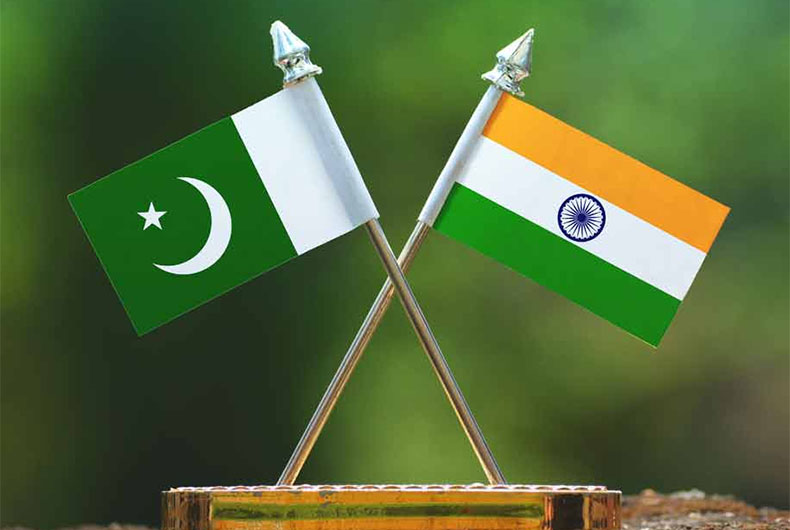Raza Rumi took a group of Pakistani politicians to India where, amid food fests and conferences and emotionally charged mushairas, the first pages of a new history were written
After weeks of hectic preparations, last-minute revolutions and all the trappings of an Indo-Pak event, we arrived at Wagah border on a humid September morning. Unlike my other visits to India, this was meant to be a different undertaking: playing the organizer, acting as co-host (Jinnah Institute) – and that too of a high-powered delegation of Pakistani parliamentarians who had consented to represent their respective parties in a “Track Two” engagement with their Indian counterparts. The India-Pakistan peace bus is often boarded by the usual suspects from civil society and the candle-light vigil ‘wallahs’, who often return home to face the cynicism of the realists, the hawks, and all those who have a stake in the status quo. But this was different.
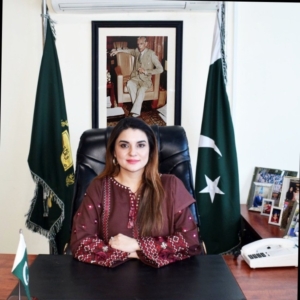
After crossing the border, we were driven to the new Attari check post, a huge facility recently built by the Indian government reflecting the preparations for the great thaw between the two countries in terms of trade and visa agreements. The Integrated Check Post at Attari replaces the quaint immigration and customs facility, and is rather impressive for its scale. Sadly, not many visitors were passing by, but it was clear that there is a certain level of confidence in the ongoing peace process that has resulted in this major investment on the border. It is a separate matter that the archaic system of handwritten record-keeping at the border disappointed all of us, as it took ages to finish the clearances while our host, the Indian Punjab Finance Minister, waited for the delegation to arrive. Our hosts in India, the Federation of Indian Chambers of Commerce and Industry (FICCI), and the mover-shaker Jyoti Malhotra, a noted journalist and peace activist, joined in the protest of entering duplicative details of our passports and other particulars. But this was a short-lived irritation and we were whisked away to a posh Amritsar hotel where a little welcome ceremony awaited us.
The delegates made fiery speeches on the merits of peace and on forgetting past acrimonies. The most inspiring arguments came from Haider Abbas Rizvi and Bushra Gohar, who are known for not mincing their words and challenging orthodox notions on Indo-Pak relations. The Punjab Finance Minister, Parminder Singh Dhindsa, also made a warm, conciliatory speech underlining the local trade issues between the two Punjab provinces. There is, in fact, an urgent requirement to move towards sub-national or regional trade pacts, as Haider Abbas Rizvi kept on reminding everybody that there was a trade check post other than Wagah-Attari. The Karachi-Munabao trade route has been closed for decades, and the distance between the two ports allows for ample opportunities for regional movement of goods and services.
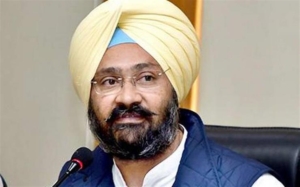
Our stay in Amritsar was short as the delegation left for Delhi the following day to attend the major event of the parliamentary dialogue organized by FICCI. In Amritsar, we did manage to visit Jallianwala Bagh and the Golden Temple, where Mohammad Malick of Dunya TV became a local celebrity as dozens of people in Jallianwala Bagh approached him and volunteered to comment on how an average Indian also clamored for peace – not unlike his Pakistani counterpart a few miles away. In Delhi, the delegation was housed at the famed Imperial Hotel, which is now a relic of the past, but is rather well-maintained with assorted Raj memorabilia. The irony could not be missed, for this hotel was also the venue where a segment of talks regarding India’s independence and Partition were held in the mid-1940s. Here was a peace contingent representing the elected legislators of Pakistan many a decade later, attempting a bit of damage control. The events of 1947 continue to plague our present, especially in the manner of how a pragmatic “Partition” went out of hand pretty quickly.
On the day of our arrival, we had been invited by Mr. Rajiv Shukla, the State Minister for Parliamentary Affairs, at his bungalow located in the Delhi of colonial times, also known as Lutyen’s Delhi. Mr Shukla had invited quite a few civil society activists and politicians. But for many Pakistanis, it was a treat to meet Justice Katju, who currently heads the Press Council of India and is often cited in the news for making some strong statements on the conduct of Indian media. In Pakistan, he featured in various discussions due to several opinion pieces he wrote on the nature and trajectory of Pakistan’s judicial activism of today – his critical remarks on the decision of the Supreme Court to disqualify a sitting Prime Minister made headlines in Pakistan. One does not need to agree with Justice Katju, but his candor is impressive. While talking to the delegation, he also mentioned how he was undeterred on expressing his views on the judicial verdicts of Pakistan, noting that there would be hostile reaction from an “Indian” judge. He chuckled, adding that “truth must always be told”. Farooq Abdullah, a veteran parliamentarian from India, was also there, and Sachin Pilot, a young minister and MP from Ajmer, also made an appearance, thus bringing different generations of Indian politicians together at this informal event. It should be noted that Pilot is married to Sara Abdullah, who is the daughter of Farooq Abdullah and sister of the present Chief Minister of the State of Jammu and Kashmir. He joined the Parliament at the age of 26 and, of course, represents the dynastic South Asian model of politics as his father Rajesh Pilot was a Congress stalwart. Pilot is the current State Minister of Communications and Information Technology.
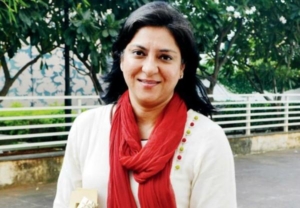
Almost all the Pakistani delegates spoke with passion, clarity, and a rare assertiveness, representing the consensus within Pakistan to take forward the peace process with India. Some genuine concerns were also expressed about water disputes and how they were influencing public perceptions in Pakistan, which were patiently discussed by the Indian MPs. On terrorism, Pakistani delegates highlighted the problems that the country was passing through, making it a victim of extremism, regional instability and terror networks. Haider Abbas Rizvi was forthright in expressing that India could not remain immune to Pakistan’s woes, or even dismiss them, for “a house burning in a locality should be a concern for the entire neighborhood”. Rizvi, known for his proficiency in Urdu poetry, cited this verse later while picking up a starter served with the name “Lahori Seekh Kabab” at Oberoi: “haadse ki zadd mein hain toh kiya muskuraana chorr dein/ zalzalay ke khauf se kiya ghar banaana chorr dein?”
The other key event of this trip was a reception where the Indian Commerce Minister, Anand Sharma, announced the forthcoming (now signed) agreements in the areas of customs cooperation, mutual recognition of standards, and redressal of trade issues. Sharma also made the memorable statement: “If Pakistan takes one step, India will take two”. Haider Abbas Rizvi stressed that “our relationship should not become hostage to any issue or incident”. During the speeches and comments, the need for activating multiple trade routes was once again highlighted and the unresolved problem of non-tariff barriers (NTBs) was also brought up by the Pakistani delegates. There was a huge media presence, and the event received much attention in the local press. While listening to the speakers, I could not help marveling at the speed at which history was being made. But keeping one’s fingers crossed – almost always – is another South Asian reflex that we just can’t seem to beat.
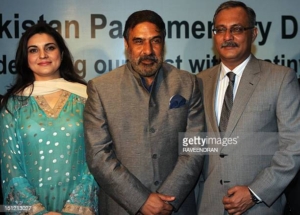
Prior to the parliamentary dialogue, the delegation was hosted by the Pakistani High Commission, where issues of trade and bilateral cooperation were informally discussed. It was informative to hear from our Mission as to how they viewed the ongoing talks, and was also useful to hear of the few stumbling blocks that required political settlement between the two sides. Pakistan’s deputy high commissioner, Babar Amin was as hospitable and helpful as ever.
The next day, an MP from the Samajwadi Party invited us all for a ‘chaat party’. To our surprise, a little ‘mushaira’ had also been organized, and among the guests, there were stars such as Jaya Bachchan and Mulayam Singh Yadav, the head of the Samajwadi Party. The poets from Delhi and U.P. recited their ‘ghazals’ and ‘nazms’, which revolved around the tales of separation on the eve of Partition, and how many families could not unite due to visa restrictions.
A few days later, India’s Foreign Minister, S. M. Krishna, came to Pakistan on a historic visit and signed a liberalized visa regime pact with Pakistan, which has yet to be fully implemented. However, a breakthrough has been made through various accords on trade – an end, one hopes, to the unfortunate policy since 1965 of enmity and hatred. A new relationship is being configured, and as a Pakistani citizen who values democracy, I am immensely satisfied to note that the peoples’ representatives are leading this process.
Raza Rumi is Director Policy & Programs at Jinnah Institute in Islamabad. The views expressed are his own. He is also a consulting editor at TFT. His writings are archived at www.razarumi.com
Published in The Friday Times – October 19-25, 2012 – Vol. XXIV, No. 36
